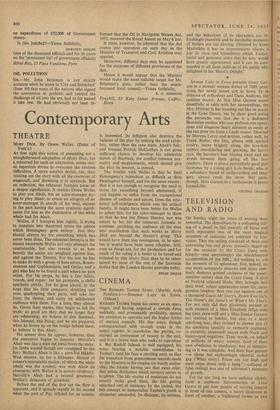THE RICHARD TAUBER STORY. (Marble Arch Pavilion.)—STRANGE LADY IN TOWN.
(Odeon.) RICHARD TAUBER began his career as an opera singer, and having acquired a certain fame suddenly, and presumably profitably, turned his attention to operetta and the higher forms of musical comedy. His fine tenor, though commercialised with enough tricks in the upper register to scandalise the purists, re- mained an instrument of beauty to the end. and it is a brave man who seeks to reproduce it But Rudolf Schock is well equipped, his voice bearing a notable resemblance to Tauber's (and his face a startling one), so that the transition from gramophone records made by the Maestro, to his singing arc barely notice- able, the former having just that extra edge, that subtle distinction which memory serves to heighten. The life stories of musicians do not usually make good films, the life getting squashed out of existence by the recital, but this attempt to immortalise Tauber's youth is altogether successful. Its dialogue, its settings, and the behaviour of its characters are re- freshingly plausible and its inevitable moments of bathos not too cloying. Directed by Ernst Marischka it has an unpretentious charm, a joie de vivre and friendliness which Tauber, jovial and generous artist that he was, would have greatly appreciated, and it can be com- mended to all those millions of his public who delighted in his 'Heart's Delight.'
Strange Lady in Town presents Greer Gar- son as a pioneer woman doctor of 1889, prac- tising her newly learnt arts in Santa Fe in defiance of orthodoxy and Dana Andrews, the resident doctor. At first Miss Garson seems dreadfully at odds with her surroundings, the Mrs. Miniver in her standing out like an acacia in the Gobi Desert, but by sheer good acting she persuades one that she is a dedicated Bostonian medico who can perform eye opera- tions and diagnose heart ailments as easily as she can pour tea from a Leeds teapot. Directed by Mervyn Leroy and written, rather well, by Frank Butler, this film, aflame with spirited rivalry, burns brightly along, the love-hate embers smouldering and sparking, the hero's eyes, the heroine's hair blazing away and the words between them going off like fire- crackers. There is also a particularly good per- formance by a young girl, Lois Smith, who in a subsidiary theme of cattle-rustling and thug- gery, almost steals the show. Not quite. though. Miss Garson in a stethoscope is pretty formidable.
VIRGINIA GRAHAM

















































 Previous page
Previous page